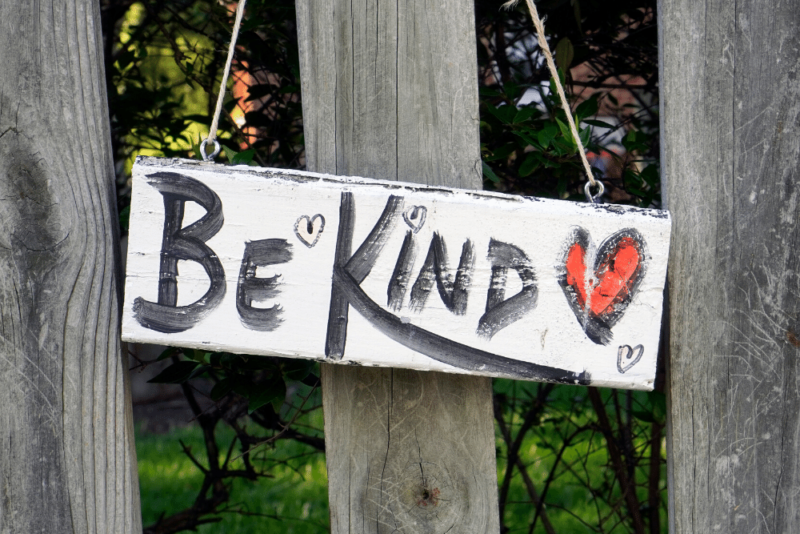
As the New Year and its resolutions approach, there’s often a feeling that if this is going to be the year that you finally eat more vegetables or make good use of that gym membership you’re paying for, then you need to channel your inner drill sergeant.
What if I told you research shows that a healthy dose of self-compassion helps us form habits that support good health? No drill sergeant needed.
Can self-compassion improve your health? Really? Yes, really In the past decade-and-a-half or so, numerous research studies have shown that self-compassion is important for mental and emotional health and well-being. While that’s not super surprising, this may be: newer research is also finding that self-compassion is important for physical health.

What is self-compassion?
According to self-compassion researcher and Kristin Neff, author of “Self-Compassion: The Proven Power of Being Kind to Yourself,” and “Fierce Self-Compassion: How Women Can Harness Kindness to Speak Up, Claim Their Power, and Thrive,” there are three elements to self-compassion:
- Mindfulness, which is being aware of negative thoughts, feelings and experiences without judging them or dwelling on them.
- Common humanity, or recognizing that we are all imperfect, and we all suffer.
- Self-kindness, which is showing yourself care and understanding when you experience those all-too-human imperfections.
The opposite of self-compassion is emotional reactivity, isolation, self-judgment and unhealthy perfectionism, all of which have been linked to depression, stress and reduced quality of life.

The stress connection
A 2017 study found that people who have higher levels of self-compassion tend to handle stress better. They have less of a physical stress response when they are stuck in traffic, have an argument with their spouse, or don’t get that job offer. They also spend less time reactivating stressful events by dwelling on them.
That’s important, because chronic stress directly harms health.
The physical responses to stress include spikes in your blood pressure and blood sugar along with suppression of your immune system. To add another layer, if you react strongly to stress, you’re more likely to employ unhealthy short-term coping mechanisms like smoking or numbing your feelings with food or alcohol. If you struggle with eating disorders, strong stress reactions can trigger flare-ups of restriction, binging or purging in order to try to feel better.
The study also found that self-compassionate people are more likely to adopt health-promoting behaviors and maintain them even if they don’t appear to be paying off in the short term.
This may be especially important in the face of a health-related setback, like injury, illness or a disappointing lab result, because self-compassion takes the edge off negative emotions — fear, frustration, and disappointment — that might arise. This helps you continue to take good care of yourself instead of getting derailed.
Related post: “How self-compassion can make you more resilient.”

Myths about self-compassion
Self-compassion often gets painted as selfish, lazy, or indulgent, but nothing could be further from the truth. I’ve found in my experience with clients, friends and family that people who are caregivers — by nature or circumstance — often find it difficult to offer themselves the compassion they freely give to others.
However, connection with the rest of humanity is a core component of self-compassion, so to fully give to others, you need to give to yourself. If you feel that other people are more worthy of compassion than you are, then you are essentially saying that you are different from other people. You’re putting up an invisible wall that makes true connection with others more difficult.
Are you a card-carrying perfectionist? (Me too, although I’ve stopped going to the meetings.) If you are, you may fear that if you are too nice to yourself you’ll accomplish nothing.
The truth is that when you make changes out of self-compassion, those changes are more sustainable than changes you make because you feel like you are unacceptable the way you are.
You’re also more likely to make kind, daily choices that support long-term well-being, rather than indulging in short-term impulses. That may mean going for a walk instead of crashing on the couch, or putting down your fork when you’re satisfied, not stuffed.
Research shows that self-compassion can help motivate us to make positive changes, possibly because it allows us to look objectively at what needs to change, then make those changes without the threat of self-criticism.
Let’s say you have type 2 diabetes and your latest blood work shows that you haven’t been managing your blood sugar well. Self-compassion will help you use that information to make changes to support better control going forward. Self-criticism can paralyze you, leaving you unable to change — and possibly ashamed to return to your doctor — leading to bigger health problems.

Becoming self-compassionate
Self-compassion should be easy, since we all want to be happy. Unfortunately, we humans also want to avoid danger.
In the face of true danger, we go into fight, flight or freeze mode. But when the “danger” is uncomfortable emotions that rise from our inevitable mistakes or failures, our response can be self-criticism, self-isolation and self-absorption. That gets in the way of doing the things that will make us happier and healthier in the long run. Self-compassion helps us view uncomfortable emotions less of a threat.
So how do you cultivate self-compassion?
Start with mindfulness. Unless you pay attention, you may be unaware of the thoughts that play and replay in your head. Practice observing your thoughts—are they compassionate, or critical?
Be curious and non-judgmental. Criticizing yourself for being self-critical adds insult to injury. Remind yourself often that to err is human, and to forgive, divine.
Finally, show yourself kindness in ways that nurture mind, body and spirit. Take time to go for a walk, do some yoga, or prepare a nutritious meal. Incorporate activities that bring you joy, like reading a novel, puttering in the garden, or listening to favorite music. Strengthen connections with people important to you. Think love, not tough love.
I mentioned Kristen Neff’s books above, but two additional books that I regularly recommend are “The Mindful Path to Self-Compassion: Freeing Yourself From Destructive Thoughts and Emotions” by Christopher Germer (another self-compassion researcher who collaborates with Neff a lot, including through the Center for Mindful Self-Compassion), and “The Mindful Self-Compassion Workbook: A Proven Way to Accept Yourself, Build Inner Strength, and Thrive” by both Neff and Germer.
This post contains Amazon Affiliate links. As an Amazon Associate I earn from qualifying purchases.
Disclaimer: All information provided here is of a general nature and is furnished only for educational purposes. This information is not to be taken as medical or other health advice pertaining to an individual’s specific health or medical condition. You agree that the use of this information is at your own risk.
Hi, I’m Carrie Dennett, MPH, RDN, a weight-inclusive registered dietitian, nutrition therapist and body image counselor. I offer compassionate, individualized care for adults of all ages, shapes, sizes and genders who want to break free from eating disorders, disordered eating or chronic dieting. If you need to learn how to manage IBS symptoms with food, or improve your nutrition and lifestyle habits to help manage a current health concern or simply support your overall health and well-being, I help people with that, too.
Need 1-on-1 help for your nutrition, eating, or body image concerns? Schedule a free 20-minute Discovery Call to talk about how I can help you and explore if we’re a good fit! I’m in-network with Regence BCBS, FirstChoice Health and Providence Health Plan, and can bill Blue Cross and/or Blue Shield insurances in many states. If I don’t take your insurance, I can help you seek reimbursement on your own. To learn more, explore my insurance and services areas page.
 Print This Post
Print This Post






